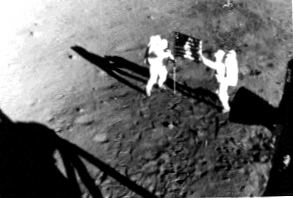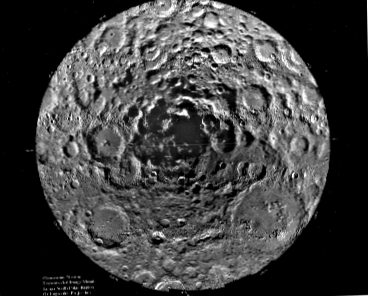Who belongs the universe?

As long as you could just look into the sky with its planets and other corps, everything was not a problem. Wherever you come and where there is nothing to get, you do not need to own anything and there is peace. But that could change soon, because the space travel has received new buoyancy — and you have desirably summarized some place how to exploit the possible resources of space. After lunar prospector has apparently found evidence that it gives it to the poles of the moon ice cream, the race could soon start to the moon to stick down the claims for the productive use.
Already now you can buy cheap claims on the moon, the mars and the jupiter at companies. Whether you are the buyers then, however, is really obvious, is of course more than doubtful. For example, lunar embassy for $ 15.99 offers a stucco country with a property on the moon. Already over 23000 owners are allegedly about the "the only recognized world alleritat for sale of basic opportunities on the moon and other planets" her luck acquired. Most of course on the moon, because you can see the and thus by the own country at least easily from the earth. Only the landing sites of the apollomissions do not want to be glower as they should remain the possession of the entire humanity. Where no real law exists, claims can also be staked like once in the wild west. Finally, there is not even inhabitants that you first distribute mub. And everyone can also present themselves as brokers who offer something for sale, which is obvious. All this is not serious, but the privatization of space flowing and then space colonization has already begun.
For example, spacedev plans in the symbolic year 2000 — in collaboration with nasa — a first unmanned flight to a non-distant asteroid (near earth asteroid prospector), on which one wants to land to investigate which rose resources to find here. You can rent instruments and let experiments export against payment and thus collect important scientific and geological data and sell. Moreover, you want to are the flight to reduce the risk of investors and customers. Spacedev sees itself as a company that "a profitable space research and development possibilities" want to create, but also intend, "in favor of his shareholders and humanity to explain the asteroids as his property." so you can create one "prospective fall for property rights in space, which could help to accelerate the opening of the universe for all."
During the nasa anticipated unmanned and cheap space flowing as lunar prospector, companies are now offering companies not only for everyone high-ranked shots of satellites, but also the first adventure holiday in the last untapped zone: just in space. On 01.01.2001, point to the start of the next millennium, so zegrahm space voyages plans the first flight for six willing tourists. After a preparation period of six days, they should then circle two and a half hours in a hundred kilometers around the earth to the "ultimate outlook" and the "ultimate experience" the weightlessness (for two minutes) to be added. Cost should the spab 98000 dollars. Reservations can be made already. 20 domestic shares should already have registered. There is still no vehicle, and it is not known from where the journey should start.
Start of lunar prospector
Not only the nasa and american companies plan to exploit the moon with his resources, and be it only to send small railway vehicles such as lunar rover initiative to the moon after the success of pathfinder on mars, with which you then send them to the moon earth — against money self-reliable — can explore this planet with a vr equipment. Even europe, the old world, does not want to deport only satellites and participate in the international room station. Since lunar prospector has now evidence that there is water on the moon, the esa, at least after the writing, will be with euromoon at the race for a place on the earth’s trabor to explore resources in the sudpolcrater and may have a space station as a room station to build gateway to the other planets. Wubbo ockels, head of euromoon: "the product’s first small step towards the long-term goal of creating an international video post of people on the moon in order to fully use its natural resources."

sudpol of the moon
From exercises like this can be seen that the space is no longer only scientific or military purposes, one no longer only thinks of a technical spin-off, but that it is also the option of being excluded from the exploitation of resources but what lies to legal rules. Already in 1967 the outer space treaty was signed, which according to the first successes and in the middle of the cold war the relevance in space — the "exploration and use of space, enclosed the moon and other sky corpers" — shelter. The space has been explained to the property of all humanity, and all companies should be carried out in peaceful intention and benefits of all people and countries independently of their economic and scientific development stage. Article ii is particularly interesting in this context, because it will take any state-owned inspiration: "the space, including the moon and other heavenly corporations, can not be explained by an assertion of the sovereignty, by use or inspention or by other means of possession of a nation." the entire space should be open to all states without any discrimination and be developed in cooperation. Limits and property markings were therefore not provided. Organizations not belonging to the government, the authorization of the respective state. However, because one obviously amed that space can only be developed due to state benefits, the agreement related to states alone, but not to individuals or companies.
Nomad
In 1979, the agreement governing the activities of states on the moon and other celestial bodies followed another international agreement, which, however, found only a few signiers in 1984. The then soviet union and the us rejected the agreement. Essentially, this agreement repeats the basic articles of the outer space treaty, but adds interesting details on ownership in article 11: "neither the surface nor the soil under the surface of the moon or any part of the same or a natural resource here is a state, an international state or non-governmental organization, a national organization or non-governmental entity or a natural person. The placement of staff, spacecrafts, equipment, equipment, stations and installations on or under the surface of the moon, but also buildings associated with the moon, no property rights on the surface or on the ground under the surface or on any other areas create." the states are supposed to be exploited, as natural resources are exploited, which should also benefit the interests and needs of developing countries. This altruism went the technically highly developed countries then probably too far.
The lunar embassy believes that both agreements — where the second is actually no validity — only the possession of land in space by states was excluded, during it — especially in the outer space treaty — not explicitly prohibited, that private companies or single with the intention of economic profite sky corporation possessions and exploit. Because the question of privately owned on sky corporations is so unregulated, one can also be used to acquire land until this is regulated right-binding. Whether you can prevail the inspention and how this should happen is, of course, another question.
Nasa lunar prospector
The lawyers lawrence d. Roberts, scott pace and glenn h. Reynolds speak in your article playing the commercial space game: time for a new rule book? Therefore also from one "legal vacuum", because the outer space treaty ruled no provisions regarding the ownership of private individuals on the moon and the asteroids. You plan to attract investors, for the establishment of market mechanisms, for example auctions, for the regulation of ownership or criminal law. Anyone who has a lot of money or the technology, will then be the first one who has property in space over property.
Even though it should come to a new wilder west in space, the gross question remains how the discarding of a claim for the strain of property rights has to happen. Is it enough to let a robot land on an asteroid? Must people have put the fuck on the floor? Became a whole asteroid or perhaps the whole moon in the ownership of a company or a private person or only a part, for example the one who a human has tapped or a robot has left? The same problem, of course, also affects the ground or water reservoir, which is found on sky bearings. The commercialization of space will definitely conflict in the absence of international agreements on ownership rights in the future.